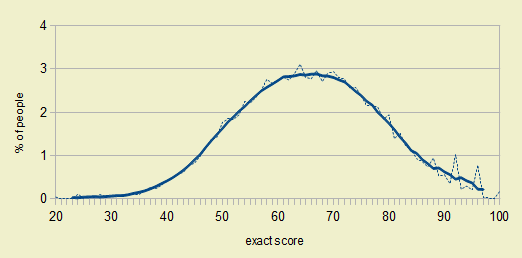Rich
The Living Force
As referenced in this thread Everyday sadists take pleasure in others' pain which referenced this article: http://www.sott.net/article/266289-Dark-Tetrad-of-personality-traits-Everyday-sadists-take-pleasure-in-others-pain
The wiki page on Machiavellianism referenced this personality test which may be of interest:
Online interactive version: http://personality-testing.info/tests/MACH-IV.php
Or plain text: http://martinfrost.ws/htmlfiles/personality.html
My score was 54 of 100.
sadism is a distinct aspect of personality that joins with three others - psychopathy, narcissism, and Machiavellianism - to form a "Dark Tetrad" of personality traits.
The wiki page on Machiavellianism referenced this personality test which may be of interest:
Online interactive version: http://personality-testing.info/tests/MACH-IV.php
Or plain text: http://martinfrost.ws/htmlfiles/personality.html
This survey itself measures only one thing -- whether you subscribe to the ideas of a 16th century Italian political philosopher. But experiments have shown that reactions to Machiavelli act as a kind of litmus test, delineating differences in temperament that can be confirmed with more traditional personality inventories. High Machs (80+) constitute a distinct type: charming, confident and glib, but also arrogant, calculating and cynical, prone to manipulate and exploit. (Think Rupert Murdoch, or if your politics permit it, Tony Blair.)
True low Machs (-40), however, can be kind of dependent, submissive and socially inept --so be sure to invite a high Mach or two to your next dinner party.
NB. Further information on Machiavelli can be found at The Prince’ by Niccol Machiavelli (1469-1527) in the Books that have added to our culture or at the ‘Conclusion’ in the ‘The Art of Spying essay’.
My score was 54 of 100.
:)This puts you in the category of the low Machs, people who will hold out for the goodness of the world and avoid manipulation. Not the people Machiavelli would approve of.



 Jung Types Test. It actually fits me quite well. This is to much fun. Wonder just how reliable the tests are. Feel like singing that song, "Getting to know you, getting to know all about you...." Getting to Know You" is a show tune from the 1951 Rodgers and Hammerstein musical The King and I.
Jung Types Test. It actually fits me quite well. This is to much fun. Wonder just how reliable the tests are. Feel like singing that song, "Getting to know you, getting to know all about you...." Getting to Know You" is a show tune from the 1951 Rodgers and Hammerstein musical The King and I.

